Research Results
Why women do not choose careers in mathematics and physics?
Verification of public masculine image in sciences by developing a new modelFY2022
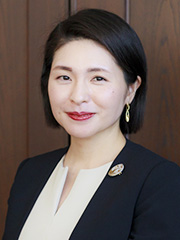
- Yokoyama Hiromi (Professor, Kavli Institute for the Physics and Mathematics of the Universe (IPMU), the University of Tokyo)
- RISTEX
- "Science of Science, Technology and Innovation Policy"
- An analysis of the factors that influence women and girls to pursue physics and mathematics (2017-2021)
Making it easier for women to learn mathematics and physics
Japan is considered to be one of the countries in the world with a low percentage of women participating in sciences. In particular, there are few women majoring in the fields of mathematics and physics. Why has the situation become like this? Is it because women are not good at science and mathematics? Is it because women are weak in numbers? These are just vague and unfounded images. That is based on a deep-seated masculine image in the fields of mathematics and physics.
The research group of the "Science of Science, Technology and Innovation Policy: Yokoyama Project" led by Professor Hiromi Yokoyama focused on the social factors and barriers against female students wishing to enter the mathematics and physics education. The group verified the influence of the social climate, including gender (*1) discrimination, on the creation of a masculine image in the field of mathematics and physics, modeled the masculine image rooted in Japanese society, and made proposals to improve the current situation.
It is expected that the information obtained from this research will be used in the planning of diversity promotion and human resource development policies to eliminate discrimination of abilities.
∗1 Gender
A concept that indicates a distinction between men and women, such as the "masculinity" and "femininity," established by social image rather than biological sex.
∗2 Diversity
The positive acceptance and respect of the diverse attributes in society, including gender, disability, race, nationality, religion, cultural background, and LGBT.
Exploring the reasons why women do not choose mathematics and physics in Japan
The students who have studied mathematics and physics at university show a high employment rate in research fields that are attracting attention, such as AI and quantum science. In other words, they are popular majors in students in sciences. However, the ratio of women in such fields among natural sciences has remained extremely low. There are many factors that could explain why there are so few women in the fields. Among those factors, one that seems to play a significant role in Japan is the strong masculine image of these majors. It is possible that the gender image of academic fields, such as "these are suited for men," is a barrier to women entering the fields of physics and mathematics. However, there has been no research in Japan to support this view.
The Yokoyama project has developed a new model to verify this issue.
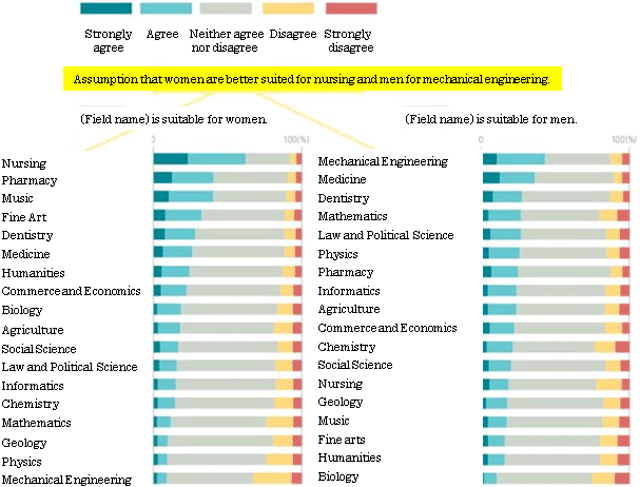
Fig. 1 Responses to the public image of gender suitability
The field that is most suited for women is nursing. In contrast, women are not for mathematics, geology, physics, and mechanical engineering.
(Source) From "Stereotypical Gender Images in STEM (Science, Technology, Engineering, and Mathematics)" Survey.
Ikkatai, Y., Minamizaki, A., Kano, K., Inoue, A., McKay, E. and Yokoyama, H. M.(2020). 'Gender-biased public perception of STEM fields, focusing on the influence of egalitarian attitudes toward gender roles'. JCOM 19 (01), A08. https://doi.org/10.22323/2.19010208.
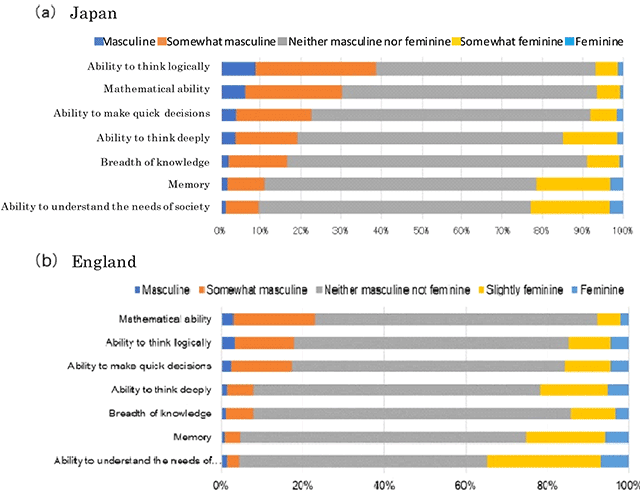
Fig.2 A gender image of the seven abilities considered necessary for STEM (science, technology, engineering, and mathematics) fields
A survey of gender images of seven abilities shows that the strength of the masculine image associated with "logical thinking" and "computational ability" is higher in Japan than in England.
(Source) From "Gender Images of Abilities Needed for STEM Fields: A Comparative Study of Japan and the United Kingdom.
Ikkatai, Y., Inoue, A., Minamizaki, A., Kano, K., McKay, E. and Yokoyama, H. M.(2021), Gender images of abilities needed in STEM fields: A comparative study of Japan and the UK, Journal of Science, Technology and Society. (19) 79 – 95 (in Japanese)
Awareness of overall society interferes with the path to mathematics and physics
Prior research has identified three factors (the field's masculine culture, childhood experiences, and gender differences in self-efficacy) that contribute to the low number of women studying informatic science, engineering, and physics at universities. In order to incorporate issues such as the deep-rooted disdain for women in Japan, this project newly added a fourth factor, "social climate regarding gender roles." It was considered that the masculine image of academia that influences students to enter the sciences may be related to the disdain for women in Japanese society.
Therefore, based on the newly developed new model (Fig. 3), the questionnaire several items corresponding to each of factors 1 through 4 were prepared, and their influence on the masculine image was investigated. To find out which items were especially related to the masculine image of mathematics and physics, an Internet survey was conducted among men and women living in Japan and in England, UK.
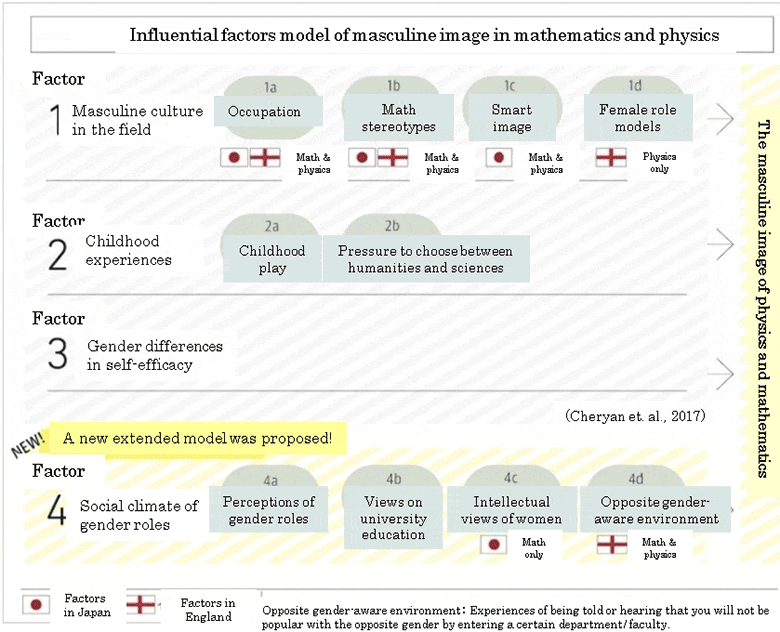
Fig.3 Proposal of an extended model
Adding the social climate as the fourth factor, a new model explains the masculine image of mathematics and physics in Japan.
<Reference> Ikkatai, Y., Inoue, A., Minamizaki, A., Kano, K., McKay, E. and Yokoyama, H. M. (2021) Masculinity in the public image of physics and mathematics: a new model comparing Japan and England. Public understanding of science
https://journals.sagepub.com/doi/10.1177/09636625211002375
The survey was conducted on the following subjects and the results were verified.
▪ 1,177 people (594 men and 583 women) aged 20 to 69 living in Japan
▪ 1,082 people (529 males and 553 females) aged 20 to 69 living in England in the UK (the United Kingdom of Great Britain and Northern Ireland).
Statistically significant differences are present for items marked with the flag symbols for Japan and/or England. With regard to factor 4 "Social climate of gender roles," there is a significant difference in mathematics for "Intellectual views of women" in Japan, and a significant difference in both mathematics and physics for " Opposite gender-aware environment " in England.
(Credit: Kavli IPMU, Design: Makoto Tomita, Associate Professor, Tokai University)
The results of the analysis showed that factor 4 "Intellectual views of women" had a significant impact on mathematics in Japan. Those who disagreed with the idea that "women should be intelligent" were more likely to view mathematics as a masculine subject. This indicates that there is a sense that excellence is the possession of men, which influences the masculine image of the academic field.
In both mathematics and physics, factor 1, "Occupation," "Math stereotype," and "Smart image" had a particularly strong impact (Fig. 4). The current study, including factor 4 in addition to factors 1 to 3, which have been pointed out so far, was able to confirm numerically which items have the most influence on the masculine image.
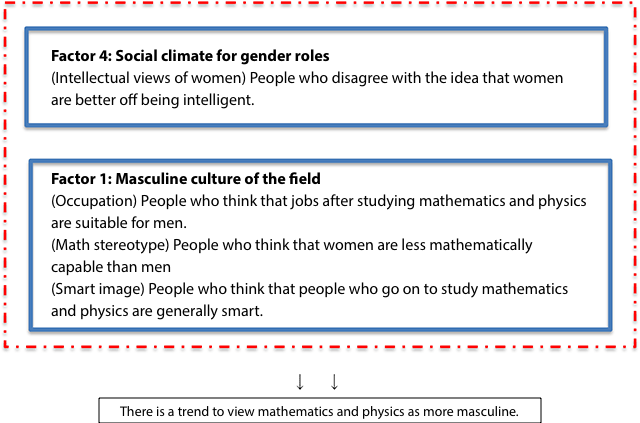
Fig.4 Factors and trends contributing to the masculine image of mathematics and physics fields
The new model reveals that, in addition to the factors pointed out in previous studies, the "Social climate of gender roles" has an important impact on the formation of masculine images of mathematics and physics.
Supporting women's mathematics and physics majors in society, school, and home
This project also provided hints on how to help female students go on to higher education in the sciences. "Male image in academia influences students' choice of majors when they will enter higher education. Eliminating the math stereotype is important when encouraging female students to enter the sciences. In fact, Japanese female students' performance in mathematics is very good by global standards. Because Japanese female students do well in mathematics, parents and teachers should encourage them that a wide range of careers will warmly welcome women after studying mathematics and physics," said Professor Yokoyama, the principal investigator of this research.
Furthermore, the following outcomes have been obtained from this project focusing on the social climate. "The strong gender image of academia as being biased against women or men is problematic in itself, and we found that this is due to gender inequality that negatively affects women's ability to be intelligent. This shows that the problem of the low number of women in sciences is not just a matter of personal choice, but a social problem".
It is expected that the dissemination of the results of this project to society will promote diversity policies that may change social trends, and human resource development policies in the research field, leading to the elimination of gender inequality awareness in everyday life, such as in the home, school, and workplace.
